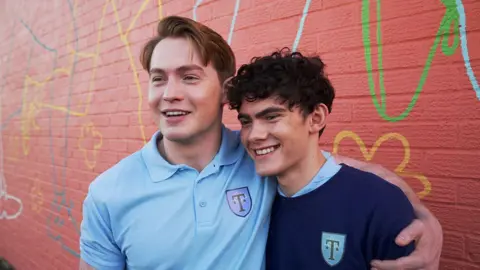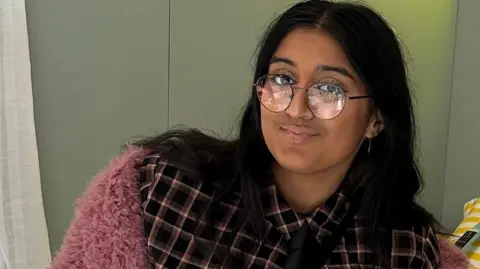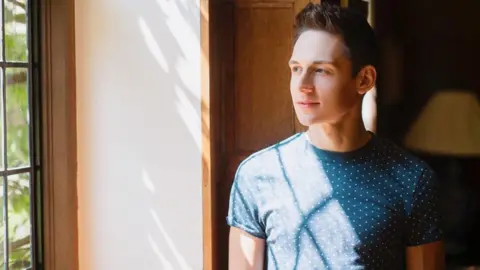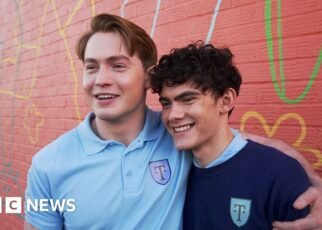[ad_1]
 Ann Gannon / BBC
Ann Gannon / BBCThe latest series of popular LGBT teen drama Heartstopper is all about Nick and Charlie’s relationship. But this series also brings Charlie’s eating disorder to the fore, a topic that is rarely talked about in the LGBT community despite studies showing it’s a common experience.
In real life, there is one school day in Year 9 that Heartstopper fan Sharan, who uses the pronoun they, will never forget.
After years of bullying, they were outed by a classmate as pansexual – and instantly became a target.
Sharan started to avoid the school canteen as a result and would spend lunch money on trinkets and hobbies, rather than food.
It was a pattern of behaviour that went undetected for months, until a teacher asked whether they had anxieties around eating.
“The teacher asked me directly after they caught me skipping lunch,” Sharan says. “It always lived in the back of my mind [that I might have an eating disorder], but I never really saw it as a problem because no-one else knew about it and I could hide it.”
- If you’ve been affected by the issues raised in this article, help and support can be found on BBC Action Line

Sharan, who is now 18, is not alone in their experience as a young LGBT woman. In 2021, Just like Us found that lesbian and bisexual teens were more than twice as likely to have had an eating disorder compared to straight girls, from a survey of nearly 3,000 teens across 375 UK schools.
The charity’s then-chief executive Dominic Arnall said homophobia was the main reason driving poor mental health and self-harming behaviours in the community.
The eating disorder charity Beat suggests that people can perceive eating orders as only affecting young middle class heterosexual white girls which can make some people with eating disorders feel invisible, like Sharan, who is of Asian heritage.
But it’s not just stereotyping that can make LGBT teens with eating disorders feel excluded.
Matthew Todd, the former editor of gay magazine Attitude, points to a lack of support in schools, where coming out can still be very difficult and come with “bullying, feeling isolated, feeling you can’t tell people”.
“When you have been told not to like yourself, you see yourself as your physical appearance, so we turn those things on ourselves,” he says.
Matthew says the rise of social media and “visual culture, [where] you cannot get away from images of bodies” may also help explain the higher rates of eating disorders within the LGBT community.
Social media wasn’t around 20 years ago when James, who is gay, first developed anorexia aged 14.

He says growing up in Wales in the 1990s meant there were few clinics that even treated disorders – and he says some therapists advised him that accepting he was gay could help overcome his eating disorder.
His gender also complicated things as “the specialists were quite confused about me being male,” he says. “I was treated as a bit of a rare specimen.”
It took eight years for him to recover from anorexia, but soon afterwards he developed bulimia. Now aged 35, he has learned to manage the condition.
James says gay men of all ages still feel pressure to have muscular bodies because they are still traumatised from being bullied at a young age, but getting into yoga and “practicing self-compassion” has helped him recover.
According to the Priory, which treats people with mental health problems, more than one million people in the UK live with an eating disorder – and about a quarter of those are men.
Just Like Us found in its survey that gay male youths were six times more likely to have an eating disorder compared to heterosexual boys.
James believes the Heartstopper storyline might encourage those who are struggling in the community to reach out for help.
In the latest season, Charlie spends time at a residential clinic and finds a pathway towards recovery.
Heartstopper’s author, Alice Oseman, was heavily involved with the Netflix show and was keen to illustrate that the route to getting better isn’t always clear – but is possible with the right support.
Sharan was able to find the support they needed through the youth group Mosaic LGBT+, able to talk openly and “the mentors showed real care”.
Sharan says Heartstopper has become a real talking point among friends.
“Charlie faces the same struggles as I did,” they say. “It’s nice to see a positive storyline of someone who does succeed in getting help and getting better, it makes me feel hopeful.”
You can listen to Access All’s Heartstopper podcast on BBC Sounds.
[ad_2]
Source link




